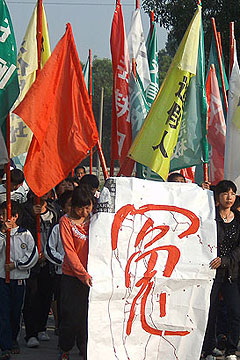
Villagers holding a poster with a Chinese word for "injustice" march around their village during a protest in Wukan village in China's Guangdong province
As popular revolts were overturning autocratic governments in Tunisia, Egypt and Libya last year, a call emerged online to bring the Arab Spring to China. Many of the conditions that triggered unrest in the Arab world — corruption, abusive officials, calcified political systems and towering gaps between rich and poor — exist in China as well. Some overseas Chinese activists hoped the tide of change sweeping across North Africa and the Middle East would inspire a similar response in the Middle Kingdom. It did, but not a Jasmine Revolution. Chinese security forces struck hard, detaining hundreds of activists, occupying planned protest sites and harassing foreign journalists. If anyone had forgotten the lessons of the bloody crackdown on the Tiananmen movement in 1989, they were reminded once again: China’s Communist Party does not tolerate organized resistance to its rule.
And yet the country boils with discontent. Last year China averaged 500 large-scale protests per day, economist Niu Wenyuan, an adviser to China’s State Council, told an official forum in February. The death of an anticorruption investigator in police custody last June touched off riots in central Hubei province that had to be put down by military police in armored cars. In August, 12,000 mostly middle-class residents of the northeastern port city of Dalian took to the streets to call for the closure of a huge new petrochemical factory. And in December thousands of residents in the coastal village of Wukan, angered by corrupt sales of communal land, kicked out their local government, prompting a tense standoff with police. “We had made appeals to 14 different, higher government departments since 2009 but we never got an answer,” says Zhang Jianxing, a 27-year-old villager who posted photos and footage of the protests online. “So we were forced to take action ourselves. When we started the whole thing, we knew we had to succeed. We weren’t going to give up.” The Wukan demonstrations forced the Guangdong provincial authorities to order an investigation and a new village election.
(PHOTOS: China Stamps Out Democracy Protests)
Why is a state that can crush a potential Jasmine Revolution with ease so racked by protest? The answer, paradoxically, has its origins in the aftermath of the 1989 Tiananmen crackdown, when paramount leader Deng Xiaoping said, “Stability is the highest priority.” Since then, Chinese authorities have gone to great lengths to tamp down dissent. This year China’s domestic-security spending is budgeted at $111 billion, exceeding military spending of $106 billion — just one sign of the importance authorities place on domestic control. But by suppressing protests rather than addressing their root causes, the government only exacerbates conflicts, argues Yu Jianrong, an expert on domestic unrest at the Chinese Academy of Social Sciences in Beijing. “The effect of 1989 was to trip this urge to control into even higher gear,” says Orville Schell, director of the Asia Society’s Center on U.S.-China Relations in New York City. “The sad message the party took out of that is if we don’t control everything, we’re going to have another episode like this. But it’s impossible to control everything. You can only fail.”
In the two decades after 1989, China accelerated its economic growth to an annual average of more than 10%, a powerful antidote to discontent. But that expansion is now causing problems of its own. As the country has grown richer, the spoils have been less equally divided. China doesn’t regularly publish its Gini coefficient, a statistic that measures the income gap. But in his last public comments before being removed from office, the populist party official Bo Xilai warned that the number had surpassed the level at which social unrest becomes likely.
(MORE: Revolt in China: After Protests, a Village Gets Blockaded by Local Authorities)
The upshot is that the compact between party and people — prosperity in return for acquiescence — is nowhere as ironclad as before because the Chinese dream is no longer as widely achievable as before. The Chinese “have met with enormous economic success, but the gap between rich and poor is growing,” says Jerome Cohen, an expert on China’s legal system at New York University. “It’s creating great resentment.” Illegal land grabs by local officials and well-connected property developers are another source of outrage; China has seen at least two suicide bombings over the past year by people angered that they weren’t fairly compensated after being evicted from their homes. There’s anger too over the health and safety hazards of polluting factories built with little oversight.
It’s all enough to turn many ordinary citizens into activists in their fight for dignity. “The desire for justice is strong,” says Cohen. “The Chinese have patience, but when they’ve put up with it for too long they will find an outlet.” And government control of courts and media means that outlet is often the streets. Says Liu Yawei, director of the China program at the Carter Center, an Atlanta-based NGO that promotes human rights and conflict resolution: “If China doesn’t address issues of accountability, [it is] never going to be able to maintain stability.”

